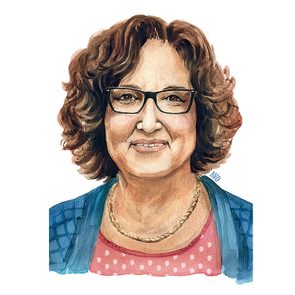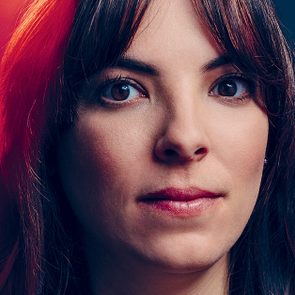After the President of The Gambia Raped Me, I Had No Choice But to Run
I knew the assault on my body wouldn't be a one-time thing. I had to leave behind the only home I'd ever known—or it would keep happening.
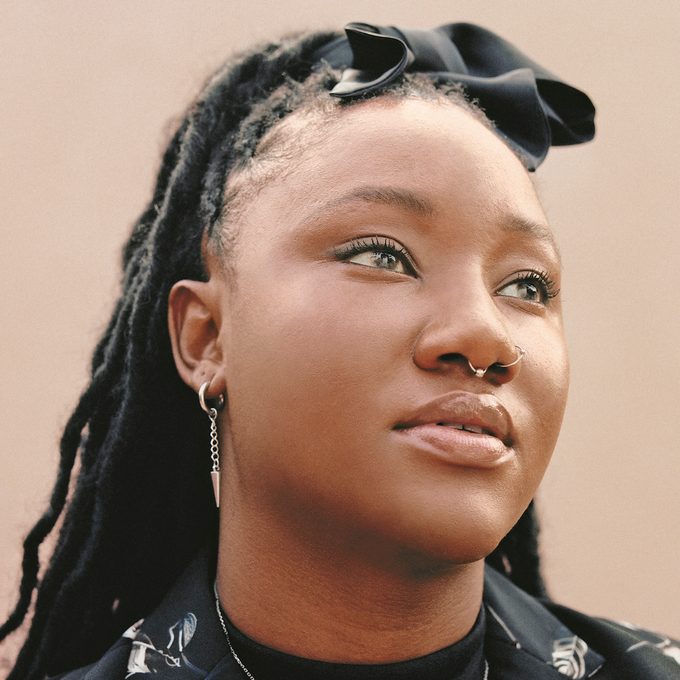
“Three peppers for five dalasis!”
“Get my onions for 10!”
“Hey, pretty lady, come buy my stuff!”
It’s June 2015, and the air in the neighbourhood market in Yundum, The Gambia, is full of dust and exclamation marks as I hurry from one vendor to the next under the hot sun. Around me, sellers have spread their items over corrugated metal and cardboard balanced on wooden platforms: a display of fish in one place, salad greens at another, rice at another still. They flap fans back and forth to keep flies from settling on their goods.
The plan for my family’s meal that day is a stuffed chicken. Covered head to toe in a black niqab, I look like many other women in the market, though I wish for anonymity more than purity. Near the entrance to the market are the two men who have followed me on the 15-minute walk from my mother’s home, and who now watch as I go from vendor to vendor.
I make my way to my destination, a shop that sells cooking oil. Tucked against the perimeter of the market, the store’s corrugated side panel provides a place just out of view of the entrance. As the vendor passes me my oil, I tuck it into the basket at my feet and sneak a look at the entrance. I can’t see the men, making it likely they can’t see me. I know the oil seller will recognize my younger sister, Penda, or mother, Awa, when they come looking for me, and that the basket of food I am abandoning here will be passed on to them.
I duck out the back of the shop to where the taxi drivers gather. I slide into the front seat of the closest car. “I need to go to Banjul,” I tell the driver, handing him 500 dalasis, just over 10 Canadian dollars. I take the SIM card out of my phone and throw it away so I can’t be tracked. My life now depends on me escaping The Gambia.
The pageant
I was 18 and in my first year at Gambia College when I decided to enter a national pageant sponsored by my country’s president, an all-powerful dictator named Yahya Jammeh. The pageant, which was meant to commemorate the coup that brought Jammeh to power, required each contestant to perform, speak on a topic related to improving life in The Gambia—mine was about eradicating poverty—and appear in our traditional tribal costumes. If I won, I was promised a scholarship to study anywhere in the world as my prize. I came second in the first round at my college, which qualified me for the final. Shortly after, in December 2014, I was crowned the winner.
At first, it was exciting. Jimbee, the president’s cousin, became a frequent visitor and caller. She invited me to many public and private meetings with Jammeh. To my shock, however, after almost six months of what I later recognized as grooming, the president proposed. I told him I wasn’t ready, that I was too young for marriage. But he was the most powerful man in our country, and he wasn’t asking me, he was telling me. The choice wasn’t mine; it was his. A few days after my refusal, Jimbee took me to a house that she promised would be mine—if I relented. My answer was still no.
After the visit to “my” house, Jimbee had continued to call me. “Hey, it’s been a while,” she said on one such call, in the casual tone of a friend. My stomach lurched. “There’s an event at the State House on the day before Ramadan starts. You have the crown—you have to come.” It was part of Gamo, a religious celebration of the birth of the Prophet Muhammad, and she said I couldn’t refuse.
I dressed for the event in a gold floor-length dress and draped a scarf over my hair in deference to the religious holiday. Once at the State House, I saw guests gathered in the garden for the ceremony. Jimbee was waiting for me inside. I was led to another room, where she told me to wait before she made her excuses and disappeared.
And then Jammeh was there. I hadn’t seen him since he had asked me to marry him. He radiated impatience, even anger.
“There’s no woman I want that I cannot have,” he said, as he crossed the room toward me. My mind scrambled to find words that might placate him, but before I could speak, he dragged me to a bedroom next door. Terror gripped me as he struck me across the face with the back of his hand.
Then he jammed a needle into my right arm. I started to scream. His hands felt big and leathery as they covered my nose and mouth. I know that I struggled. I know that I begged for help. Eventually, I passed out.
There is no word for rape in my first language, Fula, or in Wolof or Mandinka, the other common languages of The Gambia. This isn’t because it doesn’t happen; it’s because we are supposed to believe it is so rare that no word is necessary. If it does happen, we are not supposed to speak of it.
A missing word isn’t the only barrier. English has the words and women still struggle to speak of rape—and when they do, they often aren’t heard. And so, even as I speak in the language of the West, I struggle: to be clear, to be heard, to be believed. I’m not giving it words for me. I don’t need these words to remember being raped, to feel it. I can’t choose to turn off these words and forget. What happened next is with me always, whether I drape it in words of any language or not.
The escape
It was 3 a.m. by the time I got home. As I passed the curtain that covered the entrance to Mum’s room, she peeked out at me, calling, “It’s late!” That wouldn’t have worried her so much, since Gamo celebrations often continue into the early morning hours. But if she had seen me fully, she would have known something was terribly wrong.
After the house went still, I went into the bathroom and turned on the shower. The water was cold, but I didn’t care. I stayed in bed the whole next day, my body numb, waves of disgust washing over me, thinking of all the things I could have done differently. Why hadn’t I left the country immediately after his proposal? What made me think life was going to just go on? What could I do now?
I couldn’t tell anyone, especially my mother—not because she would blame me, but because she would fight back. She would not be quiet about it. She would tell my father and her family. She would tell her boss at the Ministry of Education. That would be dangerous for us all because President Jammeh wasn’t going to let anyone speak out about it. And she wouldn’t be able to put him on trial or see him jailed. She wouldn’t be able to do anything.
A few days later, Jimbee called, speaking as if nothing had happened: “Hey, girl, how are you? Are you feeling good?” She told me of another event. “All of the pageant-winners will be there. A driver will pick you up.”
It was then that I knew for certain that the rape hadn’t been a one-time thing. Jimbee was going to keep calling me. This was going to be my life. This attack on my body would keep happening.
To the border
To leave, I had to go through Senegal, which surrounds The Gambia on three sides; its fourth faces the Atlantic Ocean. As my taxi approached the ferry terminal in Banjul, where I would cross the river to Barra and then travel to the Senegal border, the smell of rotten fish discarded from boats near the dock filled my nostrils. The entrance area was crowded with cars full of people, trucks jammed with goods and pedestrians lining up for tickets. I was scared but focused: I had come this far.
If the men who had followed me to the market had reported me missing, I reasoned, the Gambia Ports Authority security may have been notified: the ferry was the obvious route. To get on, I’d have to buy a ticket, and they might ask me for identification. If I was caught here, maybe I’d end up in prison. Or worse. The official story would simply be that I’d disappeared. My family would never know.
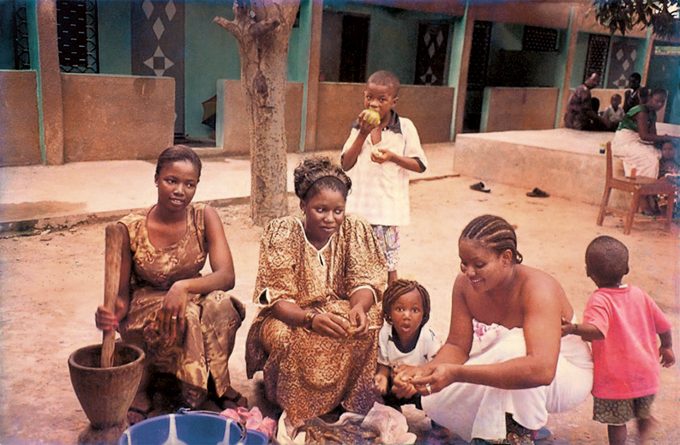
My gaze swept past the terminal entrance, down toward a section of shore. Small, open fishing boats called pirogues bobbed in the water, and in one, a man with a green net appeared ready to set out. Judging by his facial features, he looked Wolof, which was my mother’s tribe. Perhaps this was the solution to my river-crossing dilemma.
“Hey!” I called in Wolof as I made my way toward him. “Can you help me cross over?” I offered a substantial sum for a single passenger on a small motorboat.
“Okay, okay,” he said. There were no life jackets. For 30 minutes, the small boat slapped across the Gambia River estuary toward the opposite shore, the sun beating down on us. As dangerous as it looked, the tiny boat still felt safer than the ferry. Finally I climbed ashore on the sandy beach close to the Barra terminal. Nearby, private taxis and passenger vans waited for fares. I slid into a taxi, and 15 minutes later, I was at the Gambia-Senegal border.
Into Senegal
I could see the chocolate-brown building that housed the Gambian immigration office, and just beyond it, the metal barricade separating it from the corresponding Senegalese immigration office. So far, I had made three escapes: from the market, across the river and from the river to the border. Now I faced the most daunting barrier of all. Here I would almost certainly be asked for my identification, and if my departure had been noted, border officers would likely already have been alerted to watch for me.
Over to one side, I could see town-trip taxis—the kind you hire individually, rather than piling in with other passengers. I was certain these drivers would have other routes, as well: jungle roads and paths without guards.
I approached one of the drivers. “What would a town trip to the other side cost me?” I asked.
“Ten thousand dalasis,” he said. I felt deflated: it was so much more than I had with me that negotiating wasn’t an option. I thanked him and moved back to my perch by the side of the road.
I had enough money for a bus or shared taxi, but I could see that the passengers in these vehicles were being asked for their papers as they crossed. Still, not every vehicle faced the same scrutiny. I saw that the livestock trucks moved through quickly. Those drivers didn’t even disembark at the crossing; the immigration guards just waved them through.
Nearby, a cattle truck had pulled over to a gas pump. This was my chance, I thought—I could see the driver was Fula. And so as I walked toward him, I slid into a new character: a more mature Fula woman with a dying relative in Senegal and no money to pay for a bus. I told him my tale, pleading for him to take me across. To my relief, he agreed.
Through the grimy windshield, I could see the checkpoint over the cars in front of us. The line seemed to have slowed, with officers checking every cab, every car, every shared vehicle, requesting paperwork for all the passengers. Still they seemed to be letting the trucks pass through with less scrutiny.
“Nakala,” shouted the driver in greeting to an immigration officer. As the word left his mouth, part of me wanted to reach into the air and grab it, suffocate it, but it floated away across the road. The driver waved. “How are you?” he shouted to the officer. My whole body shrank inside the niqab. I could hear my every breath, feel my gut dropping.
“Good, good, you know,” replied the officer with a smile.
And then he waved us through, past a tiny metal barrier and into Senegal. Away from a dictator. Into the unknown.
What next?
On the Senegalese side of the border, I was swamped by relief and regret.
What had I done? I’d escaped, but to what? I’d left behind everything I’d ever known in The Gambia. And I could never go back. Jammeh had been president since before I was born. I couldn’t picture the possibility of anyone other than him in power. Robert Mugabe had ruled Zimbabwe since 1980—he was 91 and still in control. Jammeh was only in his 50s. I might be 40 before I could go home. Or 60. But it was too late to turn back.
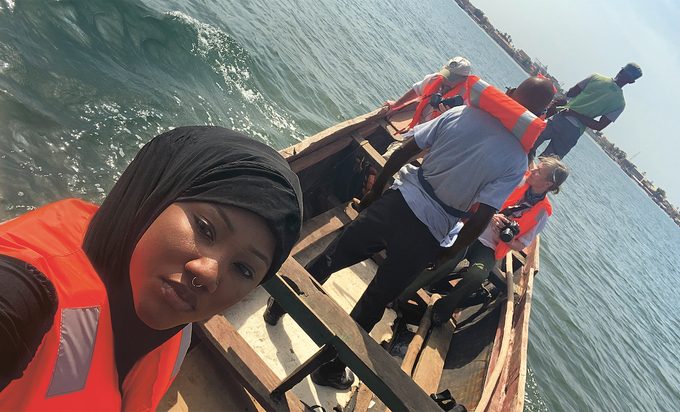
Most of my money was spent on taxis and paying the fisherman. I used some of what I had left to buy a cheap SIM card for my phone. With the new card in, I dialed Ahmad Gitteh, a schoolmate who now was studying in Canada. I hadn’t spoken to Gitteh in months, but I knew he might have connections outside The Gambia. In my desperation, I hoped he would help me.
He was confused, but he agreed to text me the name and number of Ebrima Chongan, who had been a deputy inspector of police in 1994, at the time of the coup that put Jammeh in power. Chongan had tried to rally the police to help keep the democratically elected government in place, but Jammeh had Chongan and other police officers arrested and held in prison.
Under Jammeh’s rule, the prison became synonymous with state-sponsored torture and abuse of political prisoners. Chongan was imprisoned for 994 days. Upon his release, he went into exile in the U.K. After studying law, he worked as a policy adviser in the British Home Office.
I tried Chongan’s U.K. number and got no answer, eventually deciding to try him again when I arrived in Dakar, the capital of Senegal, which was about a seven-hour drive away. I used the last of my money on a shared taxi. During the ride, I sank inside myself, trying to disappear.
Visiting embassies
It was almost midnight when I arrived in Dakar. I uncurled myself from the back seat, stretching the kinks and cramps out of my aching muscles. It would be 1 a.m. in England. Under normal circumstances, it would be too late to call anyone. But my circumstances weren’t normal. As I looked at my phone, I hoped a man who knew what it was like to end up somewhere you couldn’t come back from would be willing to help me connect with those who might protect me.
When I reached Chongan, he connected me with one of his trusted contacts: a man named Omar Topp. I met Topp the next evening, barely more than 24 hours after leaving my home. I wanted to stay in Senegal, but Topp warned me that I’d never be safe there: Jammeh had contacts all over the country. He introduced me to a police chief who not only believed my story but convinced the minister of the interior that it was too unsafe to send me back to The Gambia; Jammeh was already looking for me. While the Senegalese wouldn’t let me stay indefinitely, they did put me up in a secure apartment at a secret location and told Topp and the police chief to get to work on finding a country that would accept me as a refugee.
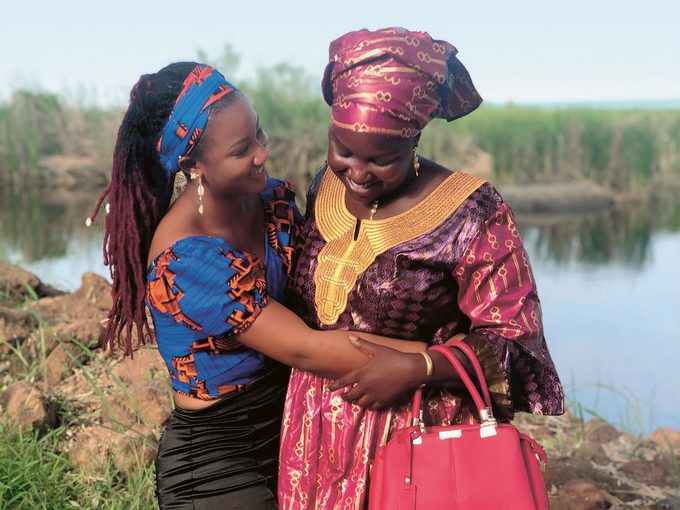
I felt safe enough in Dakar to stop hiding under a niqab or hijab, but still I dressed conservatively: usually in a long skirt and a long-sleeved shirt, with a veil on my head. The human-rights organizations Topp and I visited were supportive but cautious. Some, like the United Nations High Commissioner for Refugees (UNHCR) and Amnesty International, said they would investigate my claims if I wished them to do so, but it would take time. The embassies were equally cautious: the Americans said that an investigation could take months or longer. The interviewer at the British embassy—a man named Nigel—was friendly and supportive, and I left that meeting feeling hopeful, even as he said he needed to send his report of our conversation to his superiors in order to move the file forward. I didn’t hear from him again.
When the Canadian embassy called me to come in for an interview, it seemed like just another on a growing list of appointments. The interviewer’s office was tucked in the back corner of the UNHCR’s five-storey white office building. At the entrance, topped with barbed wire, a security guard swapped our IDs for visitor passes and waved us inside. The woman who met us was older and unsmiling. She took us to a conference room where she asked me question after question, her face showing no encouragement or sympathy as she made notes of my answers.
As I sat there, all I could think was that my future was in this woman’s control. Or maybe it was all pointless, and I’d have to go through this with someone else a week from now. The emotional ups and downs were flattening me. In that moment, though I knew that her questions were necessary and this was her job, I hated the power she had over me.
Finally, she said we were done. As we left, she told me she’d get back to me, but I was certain I’d never hear from her again, either.
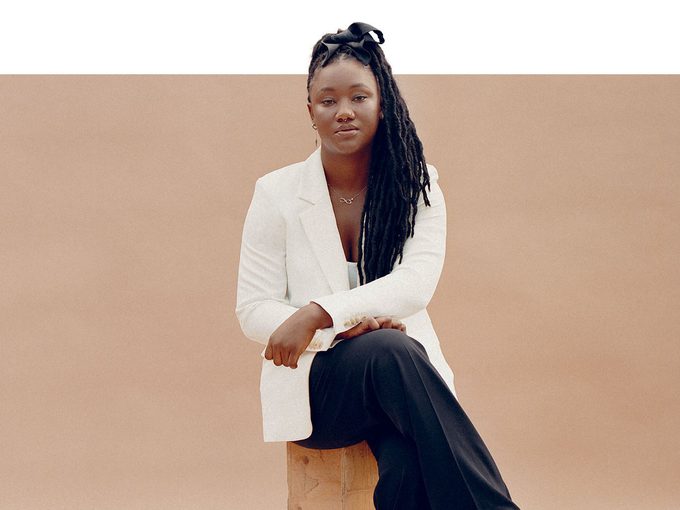
Toronto sounds great
I spent the days that followed waiting—hoping and waiting. During this time, Topp was my closest friend and confidant. In my interactions with Jammeh, I had seen the worst of how a man could use his power: to degrade, to abuse, to harm. With Topp, I saw power used to help. He was under no obligation to listen to me; he didn’t have to spend time with me, didn’t have to care. He could have turned his back on me and said, “Who cares? It’s just some girl. Let her figure it out.” Instead he helped me.
Then one day, Topp arrived at my door. I’d asked him to get me some groceries on the way over. “Guess what?” he said as he entered the apartment.
“What? There are no chickens at the market?” I joked.
His smile was wide. “They’ve transferred your documents to the International Office of Migration. You are going to Canada!”
Relief filled every cell of my body. I was going to be safe. I was going to Canada.
The next day, Topp took me to the International Organization for Migration in Dakar, where an immigration officer named Lamin greeted me. He gave me the details: I had qualified for an IM-1 visa that allowed me to enter Canada and become a permanent resident. But first I had to decide where I wanted to live.
He brought out a map and put it on the table between us. “Where in Canada do you want to go?” he said. He circled Toronto. “Toronto is diverse. There are Caribbean and Black people there and a great transit system and lots of industry, so you can find any kind of work. And it’s close to New York,” he said, pointing to the American city not far away on the map.
I put my finger on the map. “Toronto sounds great.”
In 2015, Toufah Jallow made it safely to Toronto, where she now lives. In 2019, she testified in front of The Gambia’s Truth, Reconciliation and Reparations Commission, sharing details of her rape and, in the process, sparking West Africa’s #MeToo movement. In December 2021, the commission decided that Jammeh should face prosecution for murder, torture and sexual violence. Today, Jallow heads The Toufah Foundation in support of survivors of sexual assault.
Excerpted from Toufah: The Woman Who Inspired an African #MeToo Movement by Toufah Jallow with Kim Pittaway. Copyright © 2021 Toufah Fatou Jallow. Published by Random House Canada, a division of Penguin Random House Canada Limited. Reproduced by arrangement with the Publisher. All rights reserved.
Next, read up on 10 inspiring women you didn’t learn about in history class.

